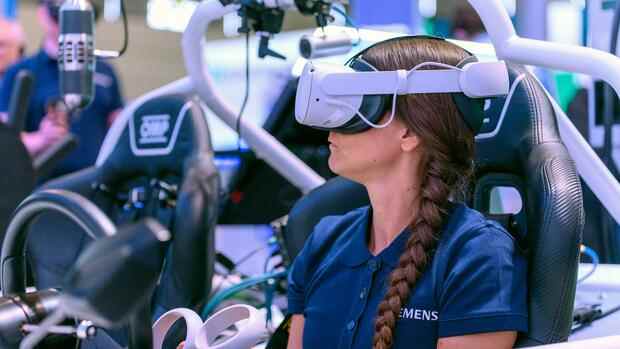Hanover, Dusseldorf The scenes that are almost unfamiliar are those that take place in front of the halls of the Deutsche Messe in Hanover on Monday morning: Visitors and exhibitors are crowded there at numerous ticket stands to gain admission to the largest industrial show in the world.
It is the first time since the outbreak of the pandemic that the Hannover Messe is taking place again as a face-to-face event. While lockdown measures and hygiene rules had recently caused the organizers to switch to a digital format, Deutsche Messe is again expecting hundreds of thousands of visitors from all over the world this year.
Only the number of exhibitors still indicates that the pandemic is continuing in other regions of the world. While there were usually around 5000 exhibitors who presented their products in Hanover, on the occasion of the 75th anniversary of the trade fair there were only 2500 exhibitors, around half from previous years.
In an interview with the Handelsblatt, trade fair boss Jochen Köckler is nevertheless relieved about the restart. “It is important that we can finally hold a trade fair again and that all the big global brands are there,” says the manager. “Google as a digital company is also represented with a booth.”
Top jobs of the day
Find the best jobs now and
be notified by email.
1300 exhibitors from China are missing
However, industrial companies such as Siemens, Bosch and Schneider Electric form the core of the trade fair. Small and medium-sized industrial companies, from the robot manufacturer Festo to the Beckhoff Group and Phoenix Contact, are also well represented.
The fact that the number of exhibitors has nevertheless fallen so sharply is mainly due to the ongoing lockdown in China. Around 1,300 exhibitors from the People’s Republic, who otherwise had booked around 30,000 square meters of space, are missing. There were also cancellations from India due to the pandemic.
Chancellor Olaf Scholz (SPD) looks at a control cabinet.
(Photo: dpa)
Russian companies are also staying away from the fair this year. The reason for this is the Ukraine war – even if the country was only represented on a fraction of the exhibition area in the past.
Nevertheless, around 60 percent of the exhibitors this year come from abroad, occupying a quarter of the area. “This time the Hannover Messe is a little bit more European,” states the head of the fair, Köckler.
Especially for smaller companies from Germany, the Hanover Fair remains an important showcase for presenting their own products. But also to get to know new technologies from the areas of sustainability, automation and digitization, which are presented by the factory suppliers at the fair.
Bosch presents fuel cell
For example, the industrial group Bosch shows how a decentralized energy supply can be implemented in a factory using hydrogen. For this purpose, the company has developed a fuel cell the size of a small sauna cabin, which, depending on the usage scenario, is said to have an efficiency of more than 85 percent.
It is an example of how the technologies of German industry should help other companies to achieve global climate goals. Big business beckons for German industry: Bosch, for example, wants to achieve sales of around one billion euros with its air conditioning technologies as early as next year.
“Anyone who is in Shanghai, for example, can connect virtually to an exhibitor and drive the robot over the stand and have conversations,” says Köckler, head of the trade fair, explaining the test offer.
(Photo: IMAGO/Rüdiger Wölk)
Telepresence robots should enable digital tours
Even though the trade fair will be held in person again this year, many of the digital event formats from the past two years will remain. Many panel discussions are streamed at the same time, and a digital tour of the fair is also possible.
To do this, around six so-called telepresence robots drive through the eleven halls, which can be controlled remotely by visitors. The devices look like tablet computers on a clothes rail that have been attached to a wheel axle. Exhibitors could book the devices for around 3000 euros, and according to the Deutsche Messe they were quickly fully booked.
“Anyone who is in Shanghai, for example, can connect virtually to an exhibitor and drive the robot over the stand and have conversations,” says Köckler, explaining the test offer. There are also digital business initiations via video telephony and chats.
Only a minority books purely digital trade fair packages
However, only around 30 exhibitors have booked a purely digital trade fair package without a stand in Hanover. Anyone who has a stand on site will automatically receive selected digital services and can also order additional digital packages.
From the point of view of the head of the trade fair, personal exchange is again gaining in strategic importance: “Our basic task is trade fairs on site, after all, the city and region of Hanover and the state of Lower Saxony are the owners of Deutsche Messe AG.”
The fair is intended to boost the regional economy, from restaurants to hotels and taxis to stand builders. Before the pandemic, trade fairs in the Hanover region generated sales of several billion euros, which had recently failed.
This year, the world’s largest industrial show was postponed six weeks due to the corona. “We will hold the Hannover Messe again every year in April. That suits the innovation cycle of the industry,” says Köckler.
More: China and the zero-Covid policy: How the state leadership is paralyzing the country
